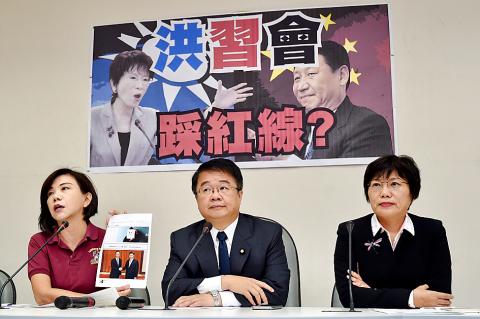The Democratic Progressive Party (DPP) caucus yesterday called on Chinese Nationalist Party (KMT) Chairwoman Hung Hsiu-chu (洪秀柱) not to sign any agreements with China, amid speculation that Hung might propose a peace treaty at a meeting with Chinese President Xi Jinping (習近平) today.
Ahead of the annual forum between the KMT and the Chinese Communist Party (CCP) in Beijing today, the caucus reiterated that it is a party-to-party event and warned Hung not to cross the “red line” by proposing bilateral agreements without government authorization, DPP caucus chief executive Wu Ping-jui (吳秉叡) said.
According to the Act Governing Relations Between the People of the Taiwan Area and the Mainland Area (兩岸人民關係條例), Taiwanese individuals and organizations are prohibited from entering into any political agreement with China unless authorized by the government, Wu said.

Photo: Chien Jung-fong, Taipei Times
Hung might try to seek concessions from China to build her legacy and secure her position against a potential challenge by former vice president Wu Den-yih (吳敦義) in the KMT chairperson election, Wu Ping-jui said.
When running as a presidential candidate, Hung showed a strong inclination toward unification with China, as she said that the so-called “1992 consensus” could evolve from the “one China, different interpretations” framework to “one China, same interpretation,” causing senior KMT members to try to muzzle her ahead of the meeting, he said.
The so-called “1992 consensus” — a term former Mainland Affairs Council chairman Su Chi (蘇起) admitted making up in 2000 — refers to a tacit understanding between the KMT and the Chinese government that both sides of the Taiwan Strait acknowledge there is “one China,” with each side having its own interpretation of what “China” means.
“It is a fake issue to distinguish between ‘same interpretation’ and ‘different interpretations,’ because none of the KMT delegates [to the forum] dare mention ‘different interpretations,’” DPP Legislator Lee Chun-yi (李俊俋) said.
The “eight understandings” reached between a Taiwanese delegation of eight local government leaders — consisting mostly of KMT officials — and China last month was already a breach of the act, Lee said.
DPP Legislator Yeh Yi-jin (葉宜津) said Hung had proposed that a peace treaty be signed between Taiwan and China, but no political party has the right to negotiate international treaties, especially when the KMT is not even in power.
Since former vice president Lien Chan’s (連戰) meeting with former Chinese president Jiang Zemin (江澤民) in 2005, the KMT has made it a tradition to hold talks with the CCP under the “1992 consensus” framework, but that framework has been undermined, Yeh said.
In their separate meetings with Xi, former KMT chairman Wu Po-hsiung (吳伯雄) reiterated the “1992 consensus” and opposed Taiwanese independence, while former KMT chairman Eric Chu (朱立倫) urged increased bilateral cooperation in the Asia-Pacific region based on the “1992 consensus.”
However, former president Ma Ying-jeou (馬英九) stressed the bond between Taiwan and China under the “one China” framework of the “1992 consensus,” Yeh said.
The DPP does not accept the “one China” principle and Hung should not make any concessions on the cross-strait relationship, Yeh said.

CAUTION: Based on intelligence from the nation’s security agencies, MOFA has cautioned Taiwanese travelers about heightened safety risks in China-friendly countries The Ministry of Foreign Affairs (MOFA) yesterday urged Taiwanese to be aware of their safety when traveling abroad, especially in countries that are friendly to China. China in June last year issued 22 guidelines that allow its courts to try in absentia and sentence to death so-called “diehard” Taiwanese independence activists, even though Chinese courts have no jurisdiction in Taiwan. Late last month, a senior Chinese official gave closed-door instructions to state security units to implement the guidelines in countries friendly to China, a government memo and a senior Taiwan security official said, based on information gathered by Taiwan’s intelligence agency. The

The National Immigration Agency (NIA) said yesterday that it will revoke the dependent-based residence permit of a Chinese social media influencer who reportedly “openly advocated for [China’s] unification through military force” with Taiwan. The Chinese national, identified by her surname Liu (劉), will have her residence permit revoked in accordance with Article 14 of the “Measures for the permission of family- based residence, long-term residence and settlement of people from the Mainland Area in the Taiwan Area,” the NIA said in a news release. The agency explained it received reports that Liu made “unifying Taiwan through military force” statements on her online

Taiwan Semiconductor Manufacturing Co (TSMC), the world’s largest contract chipmaker, said yesterday that it is looking to hire 8,000 people this year, at a time when the tech giant is expanding production capacity to maintain its lead over competitors. To attract talent, TSMC would launch a large-scale recruitment campaign on campuses across Taiwan, where a newly recruited engineer with a master’s degree could expect to receive an average salary of NT$2.2 million (US$60,912), which is much higher than the 2023 national average of NT$709,000 for those in the same category, according to government statistics. TSMC, which accounted for more than 60 percent

Tung Tzu-hsien (童子賢), a Taiwanese businessman and deputy convener of the nation’s National Climate Change Committee, said yesterday that “electrical power is national power” and nuclear energy is “very important to Taiwan.” Tung made the remarks, suggesting that his views do not align with the country’s current official policy of phasing out nuclear energy, at a forum organized by the Taiwan People’s Party titled “Challenges and Prospects of Taiwan’s AI Industry and Energy Policy.” “Taiwan is currently pursuing industries with high added- value and is developing vigorously, and this all requires electricity,” said the chairman